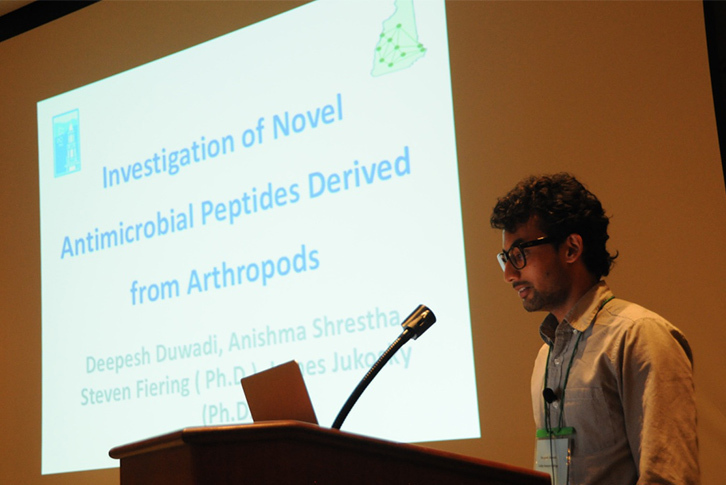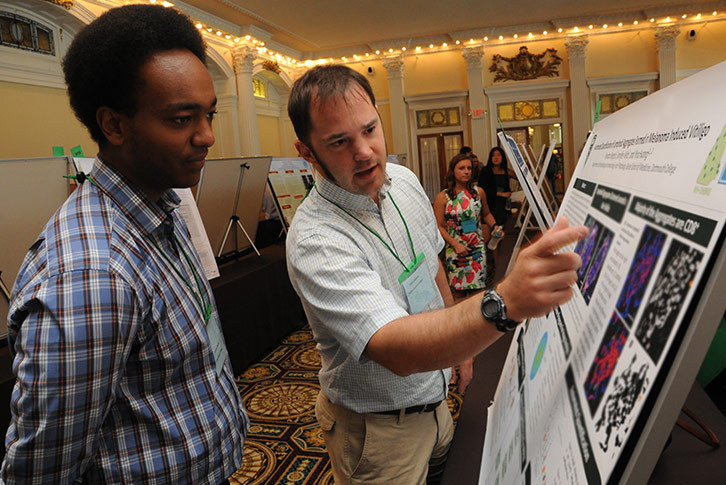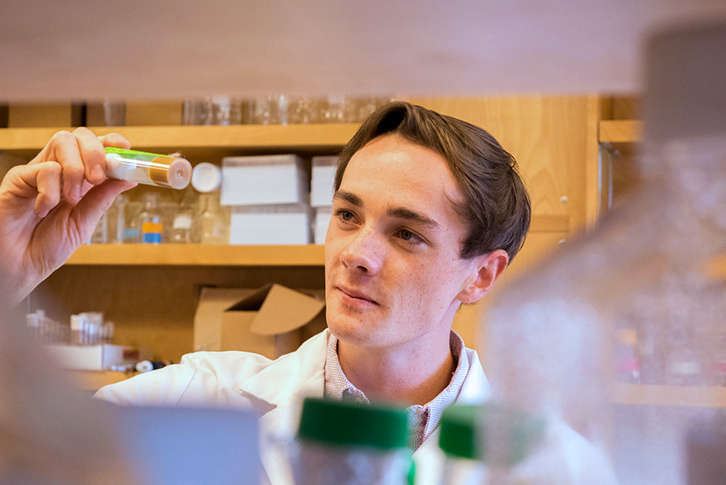“Imagine if schools taught baseball the way they taught science,” goes a popular saying. If it were so, students would spend 12 years reading about the game, with a few opportunities as high schoolers to reproduce famous plays. Only as graduates would they have a chance to get out on the field and learn what it means to play the game. Of course, the analogy is a critique of how many schools at all levels teach: out of a book and in a classroom instead of engaged in the scientific process.
At Colby-Sawyer, though, students are empowered to conduct their own research, and generous funding from a federal grant program has allowed them to take their scientific research to the next level. This summer, 13 Colby-Sawyer students, alumni and faculty across several departments attended the New Hampshire IDeA Network of Biomedical Research Excellence (NH-INBRE) Annual Meeting to present that research.
Supported by an Institutional Development Award (IDeA) from the National Institutes of Health, INBRE promotes the development, coordination and sharing of biomedical research resources within 24 states. NH-INBRE is a partnership between Colby-Sawyer and seven other colleges, including the Geisel School of Medicine at Dartmouth and the University of New Hampshire.
Biology majors Deepesh Duwadi ’17 of Dhading, Nepal, and Ben Maines ’18 of Abbot, Maine, were among seven students selected to present to the 205 meeting attendees.
Duwadi’s research focuses on an alternative method of treating bacterial infections. As bacteria have become resistant to drugs, scientists strive to adapt peptides to kill strains resistant to existing antibiotics. Duwadi tested the efficacy of several peptide sequences on mice infected with E. coli.

Associate Professor of Natural Sciences James Jukosky began the project that would eventually become the subject of Duwadi’s research. Jukosky’s previous students identified the specific peptide sequences that Duwadi tested, and Duwadi worked closely with Anishma Shrestha ’17.
“I enjoyed presenting my undergraduate research in poster form in the past,” said Duwadi, who attended the previous two annual meetings, “but it was a real honor to be selected for an oral presentation.”
Maines’ presentation at the annual meeting originated from the summer undergraduate research fellowship (ISURF) program he completed this summer. His research focused on several genes and their relationship with Wnt signaling, a group of signal transduction pathways linked to cancer.
Maines used a common experiential technique known as RNAi knockdown to suppress the expression of specific genes in fruit flies, which led to an observed reduction in Wnt signaling. His work contributes to the lab’s ultimate goal of developing targeted cancer therapies.
Eight students presented posters on their research, including biology major Yonatan Degefu ’18 of Addis Ababa, Ethiopia, who was chosen by NH-INBRE judges as one of the top poster presenters.

Like Maines, Degefu completed an ISURF program this summer. His research focused on developing a system to automatically quantify the lymphoid aggregates in mice infected with an autoimmune disease caused by melanoma.
Nursing major Jacob Pushee ’19, another ISURF participant from North Haverhill, N.H., presented the results of an experiment that explored the effect of massage therapy on bone marrow biopsy patients’ perception of pain.
Exercise science majors Olivia McAnirlin ’17 of Newport, Maine, and Christopher Manwaring ’18 of Alstead, N.H., teamed up with athletic training major Robert Madden ’18 of Malden, Mass., to present their contributions to Assistant Professor of Exercise & Sport Sciences Jeremy Baker’s research. The group studied the physiological adaptations that occur while hiking the Appalachian Trail.
Biology majors Marina Good ’20 of Princeton, Mass., and Matthew Schiller ’19 of Slingerlands, N.Y., completed a research assistantship with Professor Jukosky this summer and presented their results, which identified strains of antibiotic resistant bacteria in soil local to New London.
All of the research presented at the meeting was made possible by funding from NH-INBRE, though the organization provides more than just monetary support. NH-INBRE also facilitates collaboration between the schools; the annual meeting is their largest networking opportunity.
Much of the work conducted by Colby-Sawyer students has been conducted in partnership with Dartmouth College. In addition to working with Professor Jukosky, Duwadi and Shrestha worked in the lab of Dartmouth’s Professor of Microbiology, Immunology and Genetics Steven Fiering. All the ISURF programs were conducted at the Geisel School of Medicine.

At the meeting, Colby-Sawyer’s students had the invaluable opportunity to connect and exchange ideas with colleagues from other institutions. They also had access to career resources, as speakers offered advice on both industry work and graduate school, helping NH-INBRE students figure out which might be the right fit for them.
“That's the magic of NH-INBRE,” said Maines. “The connections I made throughout the summer, and particularly at the conferences like the annual meeting, have already brought opportunities my way.” Those opportunities include invitations to visit labs and support in troubleshooting experiments.
“Programs like NH-INBRE are essential to the dissemination of knowledge and the growth and synthesis of ideas,” he added.
And they are essential to Colby-Sawyer, where the growth and synthesis of ideas are not just a byproduct of student learning, but rather an integral component of every discipline.
Looking ahead, NH-INBRE will track its current cohort of students and continue to provide them resources long after graduation. Though Good is still exploring her future plans, she knows that NH-INBRE will help her break into a fulltime career in research. And for the Colby-Sawyer alumni who attended the annual meeting, their research has already paid off. Duwadi now works as a research assistant at the Geisel School of Medicine and Shrestha is working as a research technician at Tufts University. McAnirlin is continuing her research at Miami University in Ohio.